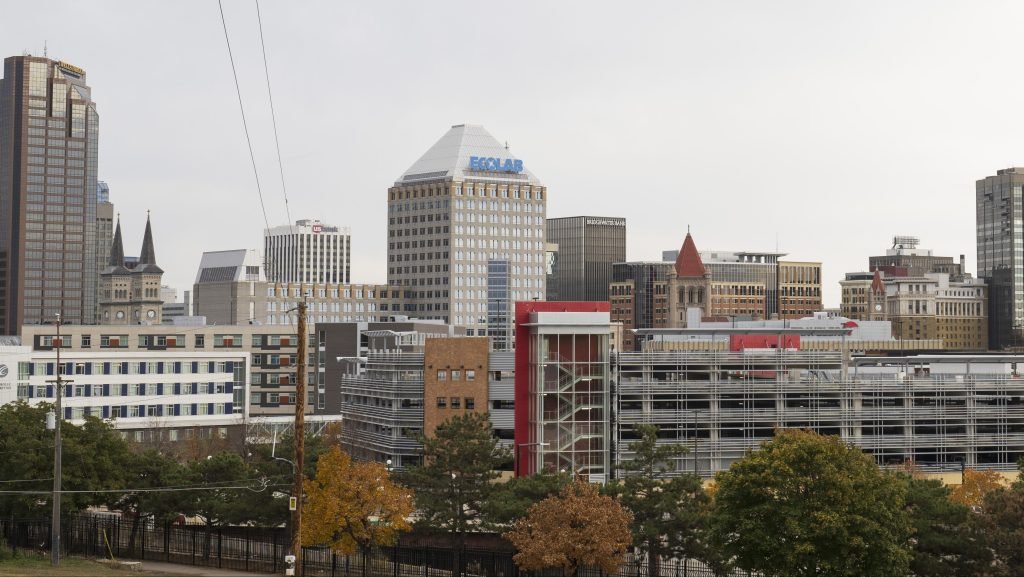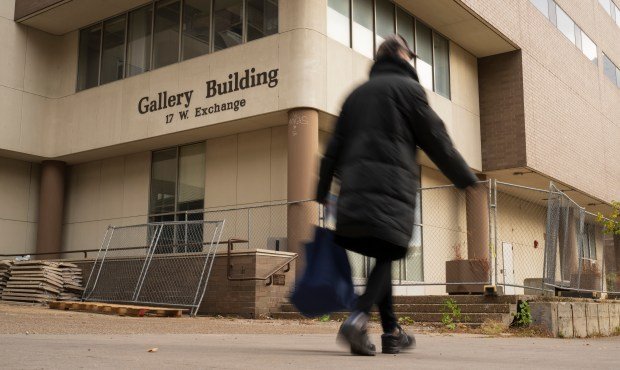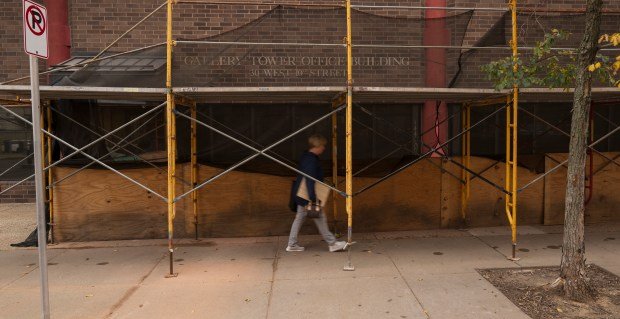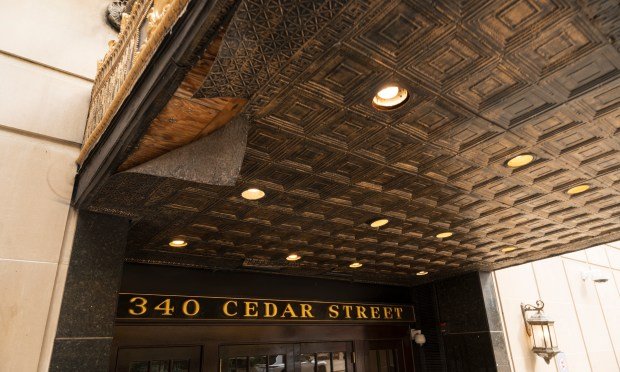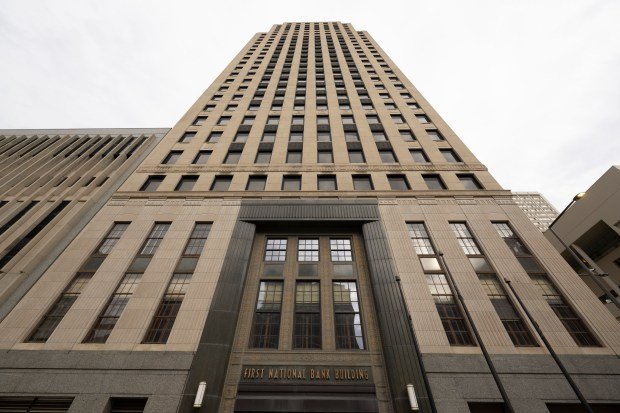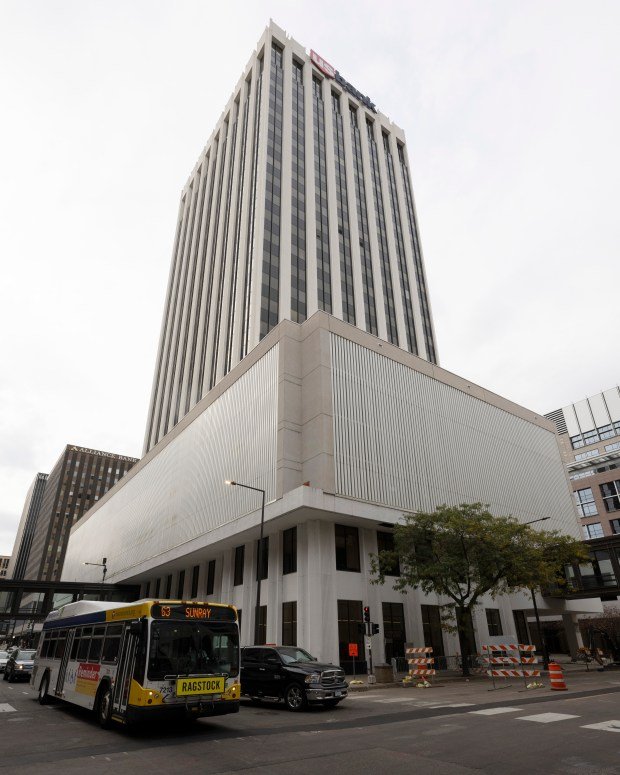When the eight-story Gallery Professional Building at 17 W. Exchange St. went to auction in early October, it captured more money at sale than the advertised minimum starting bid of $125,000 but a small fraction of the $4 million estimated market value listed in Ramsey County property records.
The Twin Cities Salvation Army has not made the exact sale price public yet until the purchase is finalized, but St. Paul developers with knowledge of the transaction say downtown building sales — or lack thereof, in some cases — have raised questions about whether downtown buildings have been overvalued in market estimates. These buildings tend to carry with them high maintenance and repurposing costs given their age, and in some cases bear the hefty financial burden of accumulated unpaid property taxes.
Those challenges have raised the possibility that rather than be converted to new uses such as housing, some buildings will simply have to come down.
Organized through St. Paul’s Downtown Alliance, a committee of downtown officials from both the public and private sectors have commissioned Gensler, a real estate design consulting firm, to study 20 downtown structures and determine which would be candidates for new commercial tenants, conversion or demolition, making room perhaps for new parks and plazas.
“There’s no question we’re going to be facing some harsh realities when it comes to the value of these buildings,” said St. Paul City Council member Rebecca Noecker, who co-chairs the downtown commercial real estate committee with Securian chief executive officer Chris Hilger.
“The sooner we come to terms with that, and recognize that, we can adjust and adapt to that new reality,” Noecker said. “Although it’s tough, and something every downtown is experiencing right now — not just us — when those values come down, it also gives us a chance to open up the market to more players, and not just to those owners who benefited from artificially inflated values.”
Among their efforts, committee officials say a new commercial redevelopment district led by a staffer to be hired early next year could seek funds to help acquire, repurpose or remove at least some of those buildings, creating space for new public plazas or other amenities better connecting Rice Park to Mears Park. The mayor’s office has its own list of priorities for downtown revitalization, including hiring a new city project manager focused specifically on office-to-residential conversions.
New valuations come out in March
Next door to the Gallery Professional Building, the two-story Gallery Tower Office Building at 27 W. 10th St. went to auction Oct. 21-23, with no minimum reserve price and opening bids starting at $1. The vacant building’s estimated market value, according to Ramsey County property records, is $1 million. A spokesperson for property seller Catholic Charities said Wednesday they would decline to share the sale price until it had been finalized.
Ramsey County Assessor Patrick Chapman said the closure of St. Joseph’s Hospital next door likely had a deep impact on the two medical office buildings, and the prospect of converting them to new uses factors into the sale price. The sale prices of comparable properties are just one of several factors that help the county estimate market values across a neighborhood as assessments come together every December, January and February. How the auction prices will impact surrounding property values remains to be seen, though Chapman expects to see some negative impact when property statements are mailed out in March.
“Some of these properties that have been selling, their future use is probably not going to be their current use, so they’re probably going to be sold at a deep discount to account for that change,” Chapman said. “We’re trying to look at all of the inputs — vacancy rates, capitalization rates, rents — to try to come up with valuations for 2025. … We’re the historians of the value world. We use what’s happening this year to determine values next year for 2025, for taxes payable in 2026. There’s always a downstream effect.”
The prospect of diminished real estate value isn’t unique to downtown St. Paul, as downtowns everywhere have faced tough questions in the era of remote work and online retail. Two downtown Minneapolis office towers — the Forum buildings — sold in September for $6.5 million, or 91% lower than the property’s last sale, which was $73.7 million in 2019.
Another vulnerable time
For some St. Paul-based developers, that’s slim consolation.
“Downtown St. Paul is in another vulnerable time in its history and needs significant new capital investment to invigorate the market,” said developer Jamie Stolpestad. “Unfortunately, there are many barriers to new investment, ranging from the worst rent control ordinance in the U.S., to uncoordinated state, county and city efforts and resources, to diffused nonprofit sector focus, and lingering concerns about public safety and the perceptions of public safety downtown.”
“Hopefully we will see aggressive action to lower real estate tax valuations to current market values, enabling new tax increment financing and other financial incentives, and a streamlined permitting regime soon,” Stolpestad added. “I am hopeful that St. Paul presents a broad and thoughtful package of economic and administrative initiatives soon that will position it for success versus the many Upper Midwest and national markets facing the same challenges and that are all chasing the same investment dollars. I hope we don’t face a scenario where things will get worse before they get better.”
Chapman said a potential silver lining for St. Paul is that the city has been relying on its downtown tax base less and less over the years, which could be interpreted positively or negatively.
Downtown buildings accounted for almost 9.5% of all property taxes pre-pandemic, for taxes payable in 2021. For taxes payable this year, that number has fallen to 7.5%. Commercial properties downtown — office buildings, retailers, hotels — used to cover 5.7% of the city’s taxes. This year, it’s about 4.2%.
In addition to building closures, “we’ve had some conversions from office space to residential space,” Chapman said. “There’s a couple factors in that number. St. Paul’s been ahead of the curve in terms of that type of transition. We’ve been doing conversions for 10-12 years. There’s exposure there, but not as great as we thought. St. Paul is a well-rounded community, and it doesn’t rely so much on the downtown core to support the whole tax base.”
Madison Equities owes $3.24 million in property taxes
When the St. Paul Athletic Club building on Cedar Street went to auction in September, the 13-story office, hotel and gym building did not meet its undisclosed reserve price and failed to sell. The structure, owned by John Rupp, carries an estimated market value of more than $3.8 million — down from $6.5 million in 2020. It also carries on the books some $536,000 in unpaid property taxes, lining it up for potential tax forfeiture in 2026, according to property records.
In downtown St. Paul, unpaid property taxes are not a unique story.
One of the potential stumbling points for banks and prospective buyers is that a number of downtown office buildings are behind on tax payments that accrue interest and penalties. Those taxes would likely have to be paid off before a buyer could acquire and repurpose a building for a new use, such as residences.
The most dramatic example is likely Madison Equities, which put 1.6 million square feet of property on the market together in April. The 10 properties — which include downtown office buildings and parking ramps — owe a combined $3.24 million in delinquent property taxes.
The U.S. Bank Center owes $1.16 million. The First National Bank building owes $1.13 million. Alliance Bank Center owes $494,000. The office building at 375 Jackson St. owes $390,000. And the Stadium Parking Ramp owes $67,000.
Some properties are already trading hands. Madison Equities recently lost the 11-story Lowry Apartments building at Fourth and Wabasha streets when the former hotel was acquired by its own mortgage lender at a foreclosure auction. At the city’s request, a Ramsey County District Court judge appointed a receiver to manage the property in light of a long list of code deficiencies.
A disincentive to walk
Noecker said she and other active members of the St. Paul Downtown Alliance are well aware that some of the Madison Equities properties have become vacant or blighted, and their lack of upkeep contributes to the sense that there’s a bit of a dead zone between Rice Park and Mears Park where foot traffic is sparse and vacant or underused buildings are locked and dark.
“We have this really compact downtown that’s small and walkable, but people don’t want to walk … largely because it feels unwelcoming,” Noecker said. “It’s really that doughnut hole in the middle that’s a disincentive to walk between Uppertown and Lowertown.”
“Madison Equities owns some of those key buildings that have been kind of an impediment to people wanting to walk through our downtown,” she added. “We (as the city) or a private partner have to get control of the buildings first. That’s step one.”
To enable acquisitions, the Downtown Alliance hopes to establish a commercial redevelopment district that would span much of downtown. Led by a new staffer likely to be hired in early 2025, a new downtown corporation would find ways to solicit funds, partner with businesses, acquire real estate and design public spaces to replace reconfigured and demolished sites.
“This would be for all of downtown,” Noecker said. “We’re going to bring this person on board and raise the money to give them a staff.”
It remains to be seen which buildings would be the best candidates for the proverbial wrecking ball — and what kind of uses might replace them. Sometimes, Noecker said, empty space designed correctly — think of a college quad located between busy academic buildings — might be the most attractive use of them all.
“If you think of Boston or Cambridge, there’s big public spaces where you can have a pop-up event or public market,” Noecker said. “I was just in Toronto and I walked into a plaza and there were two different festivals happening — a Korean festival and a vegan festival.”
Originally Published:

